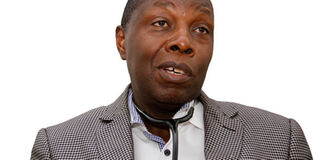Prime
What you need to know as we prepare for Covid-19 outbreak

Dr Vincent Karuhanga
What you need to know:
- Washing hands. Washing hands does not require use of medicated soap, even ordinary soap can do because medicated soap kills mostly bacteria and Covid-19 is a virus.
Today the world, big as it is, is under lockdown as a result of the smallest living organisms called coronavirus.
Uganda seems to have so far been spared because of a combination of factors, including a large resistant African population, young population (with 77 per cent of Uganda’s population being under 25 years), a generally warmer flu unfriendly season, old population being in rural scattered settlements and lack of general testing services to find out first hand those that could be sick but not showing serious symptoms.
Also, majority of Ugandans are blood group O which is generally resistant to infectious disease compared with non-O blood groups, and not surprisingly, it has been said blood group O is resistant to Covid-19 while A is most vulnerable.
There is neither cure nor preventive vaccine for Covid-19, but the sick can be given supportive care, which includes rest, fluids and fever relief. But if severe support to vital organ functions may be required, then hospital admission isolation is necessary.
Many drugs have been tried, including chloroquine that was discovered in 1934 and has been used to treat malaria, amoebiasis and inflammatory conditions. Apart from its well-known antimalarial effects, it also has antiviral properties which are under investigation for treatment of Covid-19.
Chloroquine exerts direct antiviral effects, inhibiting pH-dependent steps of the replication of several viruses, including members of the flaviviruses, retroviruses, and coronaviruses. Because of its modulatory properties on the immune system by suppressing production and release of tumour necrosis factor alpha and interleukin 6, it has been useful in inflammatory diseases like rheumatoid arthritis and lupus erythematosus. Viral diseases also have inflammatory complications in which, therefore, chloroquine can be useful.
Chloroquine has been sporadically used in treating SARS-CoV-2 infection, but Hydroxychloroquine which shares the same mechanism of action and is safer and more tolerable, has been preferred in treatment of the inflammatory (autoimmune) conditions such as RA.
Though currently there is no evidence to support the use of hydroxychloroquine in SARS-CoV-2 infection, a loading dose of 400mg twice daily of hydroxychloroquine sulphate given orally, followed by a maintenance dose of 200mg given twice daily for four days seems to show some promise.
Much as we have been spared, we should not rest on our laurels, but continue preventive measures, including washing hands often with soap and running water, or cleaning hands frequently with alcohol-based hand sanitisers, avoiding touching our faces, cover the nose and mouth when coughing, or sneezing into a flexed elbow, and avoid close contact (six feet) with anyone with a cold or flu-like symptoms.
Washing hands does not require use of medicated soap, even ordinary soap can do because medicated soap kills mostly bacteria and Covid-19 is a virus. One should wash with running water for at least 30 seconds.
Many sanitisers are not worth using since they are either fake, are mere antibacterial, do not contain alcohol or are weak (less than 60 per cent alcohol). One should rub in the sanitiser to clean up to the wrists until the sanitiser dries up (around 30 seconds).
You can make your own sanitiser at home by using Isopropyl alcohol (100%) 3/4 cup, aloe vera gel 1/4 cup and 10 drops of lemon juice. Much as there is a craze world over to wear masks, it is only if one is sick and around other people that the mask can help to stop the spread to those not sick.
If one is not sick, it is not necessary to wear a mask unless, of course, one is an attendant to a sick person who is unable to wear a mask.
If you fall sick with cough, difficulty in breathing, a nose that is stuffy more than runny, a sore throat, joint pains, muscle aches and a fever you, should contact your doctor for help since going to public places, including hospitals, may spread Covid-19.
If one can, tests can be done at the Uganda Virus Research Institute in Entebbe. If not seriously sick, one should self-isolate. But if seriously sick, then you may require being admitted in a hospital where admission isolation can be done.
Dr Karuhanga is founder of Friends Polyclinic
[email protected]




